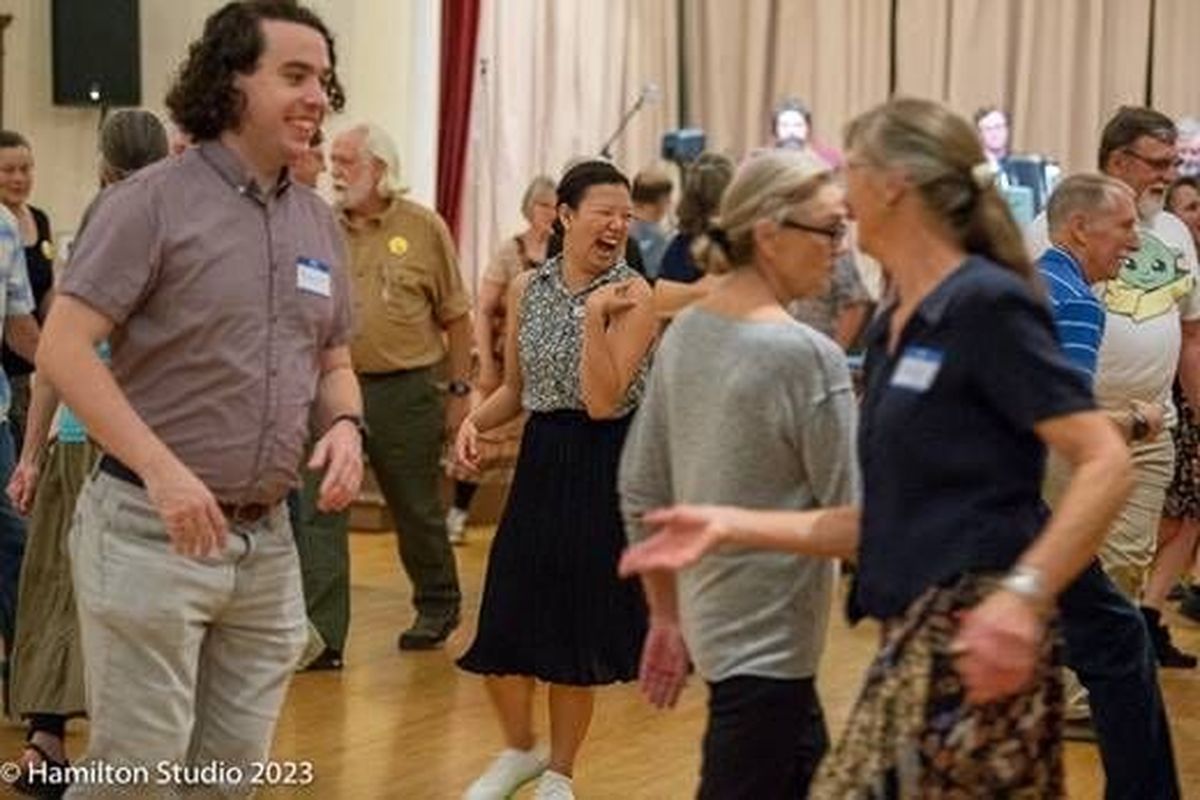Stepping into community: Spokane Folklore Society contra dances foster friendship and fun

The lively lilt of contra dance music played by local band Reel Friends filled the Woman’s Club Hall on Sept. 18, as two lines of dancers faced each other, moving through simple steps following the direction of a caller.
Hosted, by the Spokane Folklore Society, the dances provide community, connection and folksy fun.
Since 1977, the society has sponsored folk music, song and dance events. The nonprofit is an all-volunteer organization.
Originally, SFS mainly sponsored concerts. That changed when Penn Fix introduced the contra dance series in 1980. That second Saturday series continues and he launched the Wednesday night dances in 1988.
Contra dancing is a traditional social dance from New England. It arrived with the Pilgrims and saw a revival during the folk music movement of the 1960s.
It differs from square dancing in that contra dances always feature live bands, dancers move along two lines instead of squares, and the caller walks through each dance before the music starts.
“I love dancing to live music, it is uplifting and joyous,” said Fix, who serves as secretary of the organization’s board. “Contra dancing is participatory, not performance-based.”
The bands draw on traditional Irish, French Canadian and New England music, but that’s not the only source.
“New tunes and new dances are constantly being written and passed by word of mouth,” Fix said. “It’s a live folk process.”
That process includes creating a welcoming community.
“You can come single, or come with a partner. Ultimately, you’ll be dancing with 40 people,” he said. “What’s great about it is that it’s so accessible. All the moves are walking steps.”
That’s what attracted Jenna Metzer to the group.
“I’d danced a little as a kid, but not a lot,” she said. “All the dances are called, so if you’re a beginner you don’t need to be intimidated.”
The melodies captivated her.
“I love the liveliness of the music,” she said. “Folk music is so happy that you have a hard time not dancing!”
Contra dance became a gateway dance for Metzer.
“It got me into swing dancing and now I dance at least three times a week!”
She and her husband enjoy the community they’ve found at the Folklore Society.
“I’m 27,” she said. “I’m blessed to be with lots of very experienced dancers.”
Cathy Dark is one of them.
The longtime dancer and educator started dancing in sixth grade with the Silver Spurs. She went on to earn a master’s in dance anthropology and taught at Oregon State University. When she retired and moved back to Spokane, she quickly joined the Folklore Society.
“Contra dancing is totally accessible,” she said. “I’ve seen beginners do the 15-minute walk through and by the end of the night they’re dancing like crazy!”
In addition to finding a local community, Dark said the dance offers connections across the U.S.
“You can go to different places and find a contra dance community,” she said. “You walk in the door and you’ve got friends.”
That proved true for Linnell Hinchey.
She drove from Sandpoint to attend her first SFS dance in 1988.
“It’s such a welcoming group of people and it’s so inexpensive!” Hinchey said. “Ten dollars for nonmembers for a ridiculous amount of fun!”
When she moved to Spokane as a single mom, the Saturday dances became her “me” time.
Besides being directly involved with dancing, the Spokane Folklore Society also serves as an umbrella for related organizations, including the Fall Folk Festival. The festival began in 1995 as a one-day event at the Unitarian Church and has grown to a two-day free event held at Spokane Community College with thousands in attendance. It showcases the multicultural nature of our community through music, song, and dance.
“It reflects the broader mission of SFS, supporting traditional music and dance from many cultures in the Inland Northwest,” Fix said.
Hinchey began volunteering with the Fall Folk Festival in 1996 and hasn’t missed a year since.
“It’s so important to build community,” Hinchey said. “I’ve made lasting friendships through the folklore society. “It’s one of the best things Spokane has going.”